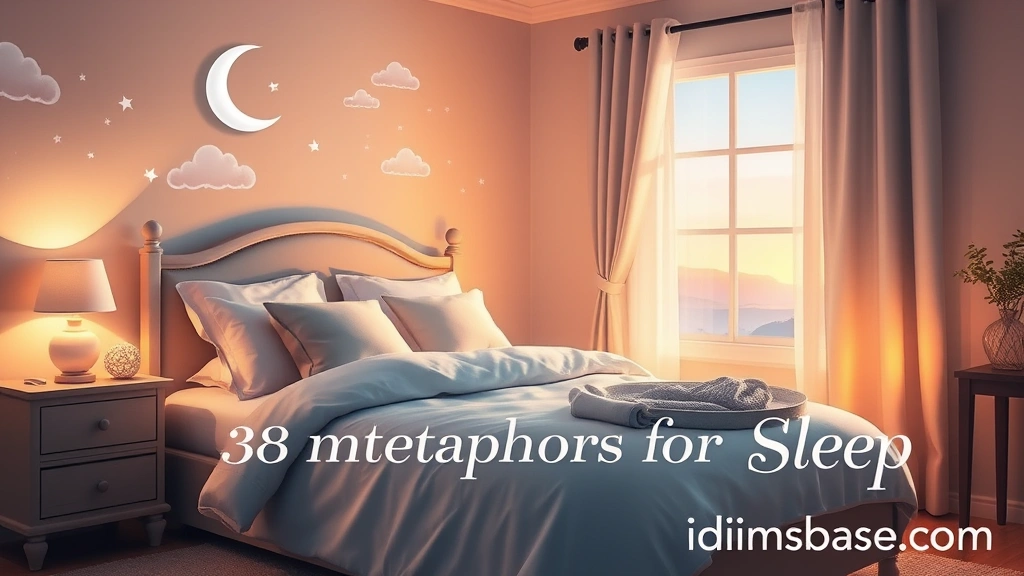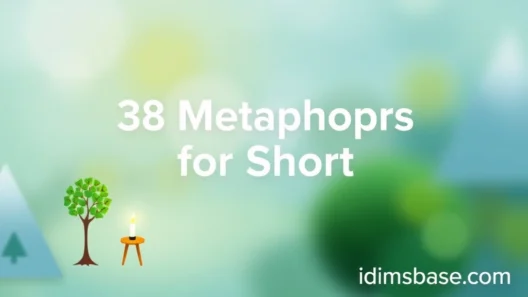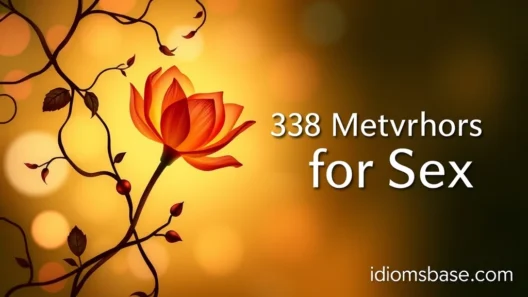Have you ever noticed how many ways we talk about sleep without actually saying "sleep"? It's like our minds instinctively reach for a little creative magic to describe that wonderfully mysterious state. From drifting off to dreamland to hitting the hay, these expressions paint vivid pictures of rest, escape, and renewal. It's truly fascinating, isn't it?
Sleep isn't just a biological necessity; it's a profound experience, a daily reset button, and sometimes, a much-needed escape. That's why language has gifted us with so many beautiful, quirky, and sometimes humorous ways to describe it. In this journey, we're going to explore 38 fantastic metaphors for sleep that you might already use, or perhaps discover some new favorites to add to your vocabulary!
The Wonderful World of Sleep Metaphors
Metaphors are like secret doorways into deeper understanding. They allow us to connect abstract ideas (like sleep) with concrete images, making our language richer and more evocative. Ready to dive in? Let's explore these delightful expressions!
Common and Classic Sleep Metaphors
These are the tried-and-true phrases that have been helping us describe sleep for ages.
- Dreamland: Ah, the classic! It perfectly captures the idea of a magical place we visit when we sleep, often filled with dreams. You're not just sleeping; you're on a journey!
- The Land of Nod: Similar to dreamland, this phrase suggests a whimsical, almost mythical place where nodding off is the first step to entry.
- Hitting the Hay: This one takes us back to simpler times when beds were literally made of hay. It’s a wonderfully rustic way to say you’re going to bed.
- Catching Zs: Those little Zs floating above a sleeping cartoon character? They became a universal symbol for sleep, and now, "catching Zs" means grabbing some shut-eye.
- Passing Out: While it can sound a bit dramatic, it simply means falling asleep very quickly, often from exhaustion.
- Drifting Off: Imagine a boat gently floating away on calm waters. That's exactly how it feels when you slowly, peacefully fall asleep.
- Slipping Into Slumber: This metaphor suggests a smooth, effortless transition into the state of sleep, like slipping into a warm bath.
- Logging Zs: Like a lumberjack meticulously counting logs, this implies a concerted effort to get a good amount of sleep. You’re really putting in the sleep work!
- Going to Bed: The most straightforward, yet still a metaphor for the action of transitioning from wakefulness to sleep in a designated place.
- Crashing (out): When you're utterly exhausted, you don't just go to sleep; you "crash." It implies a sudden, heavy fall into sleep.
- Sleeping Like a Log: A log is heavy, still, and unmovable. This metaphor beautifully describes a deep, undisturbed sleep.
- Knocking Out: Similar to crashing, this implies being so tired that sleep takes over almost instantly, as if you've been "knocked out" by exhaustion.
Evocative and Poetic Sleep Metaphors
These metaphors add a touch of elegance and imagery to the act of sleeping.

- Embracing the Sandman: The Sandman is a mythical character who sprinkles magic sand in your eyes to bring on sleep and dreams. It's a charming, almost childlike metaphor.
- Journey to the Stars: This one conjures images of ascending to a peaceful, celestial place, far from earthly worries.
- The Arms of Morpheus: Morpheus is the Greek god of dreams. To be in his arms is to be deeply, peacefully asleep and dreaming.
- A Blanket of Darkness: Sleep often comes with the quiet and stillness of night, making darkness feel like a comforting, enveloping blanket.
- A Mini-Vacation: Sleep is a break, a pause from the demands of the day, much like a short holiday for your mind and body.
- A Soft Cloud: Imagine sinking into something incredibly soft and fluffy. That's the feeling this metaphor evokes for a comfortable, peaceful sleep.
- The Great Unwinding: After a day of tension and activity, sleep is the process of loosening up, relaxing, and letting go.
- A Daily Resurrection: You go to sleep tired, and wake up refreshed, almost like a rebirth. It’s a powerful metaphor for renewal.
- A Gentle Escape: When the world feels overwhelming, sleep offers a temporary, peaceful retreat from reality.
- The Quiet of the Night: Sleep often aligns with the hushed hours, where the world slows down, and you can truly rest.
- A River of Rest: Imagine a gentle river flowing smoothly. This describes a continuous, uninterrupted flow into deep sleep.
- A Sweet Surrender: Sometimes, the best thing to do is to give in to the overwhelming urge to sleep. It's a peaceful, welcome surrender.
Humorous and Informal Sleep Metaphors
Sometimes, we like to inject a little humor or informality into our sleep talk!
- Recharging My Batteries: We're like electronic devices, and sleep is how we power up for the next day. It’s a very modern and relatable metaphor!
- Clocking Out: Like finishing a shift at work, this means you're done for the day and ready for rest.
- Going Under: Often used in medical contexts for anesthesia, it's also a playful way to describe falling deeply asleep.
- Taking a Nosedive: When you fall asleep very quickly, sometimes unexpectedly, it's like a sudden plunge into slumber.
- Hitting the Sack: A more informal version of "hitting the hay," "the sack" refers to a bed, and "hitting it" means going to sleep.
- Sawing Logs: This humorous metaphor refers to the sound of heavy snoring, making it sound like someone is literally cutting wood!
- Conking Out: Similar to "crashing" or "knocking out," this implies a sudden, often involuntary, descent into sleep due to extreme tiredness.
- Bunking Down: This colloquial term means to settle down for sleep, often in a casual or temporary sleeping arrangement.
- Catching Some Shut-Eye: Your eyelids "shut" when you sleep, so this is a playful way to say you're going to get some rest.
- Taking a Nap: While "nap" is a word for short sleep, "taking a nap" can be seen as "taking a short rest" or "a short break from wakefulness."
- Going to My Cocoon: This implies wrapping yourself up in your bed, safe and sound, just like a caterpillar in its cocoon.
- Sleeping Like a Baby: Babies are known for their deep, peaceful sleep (when they're not crying, of course!). This describes a very sound slumber.
- Entering Sleep Mode: A very tech-savvy metaphor, comparing yourself to a computer or device that goes into a low-power state for rest.
- Blink-and-You'll-Miss-It Sleep: This humorously describes falling asleep so quickly that if you blinked, you might miss the transition!
Key Takeaways

- Language is Rich: Our language offers a treasure trove of creative ways to describe the simple act of sleeping.
- Metaphors Deepen Understanding: They help us grasp the emotional and experiential aspects of sleep, not just its biological function.
- Variety is the Spice of Sleep Talk: From poetic to humorous, there's a metaphor for every mood and situation when talking about sleep.
- Sleep is Universal: The sheer number of metaphors shows how universally important and relatable sleep is to the human experience.
Frequently Asked Questions (FAQ)
Q1: What is a metaphor?
A metaphor is a figure of speech that directly compares two unlike things without using "like" or "as." It says that one thing is another, even though it's not literally true. For example, "sleep is a mini-vacation" doesn't mean sleep is literally a trip, but it highlights the shared qualities of rest and escape.
Q2: Why do we use so many metaphors for sleep?

We use many metaphors for sleep because it's a complex and essential human experience that's hard to describe directly with just one word. Metaphors allow us to capture its various aspects: its restorative power, its mysterious dream world, its quiet nature, and the feeling of letting go. They make our language more vivid, interesting, and relatable.
Q3: Are there cultural differences in sleep metaphors?
Absolutely! While many cultures share similar ideas about sleep (like it being a time for rest or dreams), the specific metaphors can vary greatly. For example, some cultures might have metaphors related to specific animals known for their sleep habits, or spiritual beliefs about the soul's journey during sleep. The metaphors we've discussed are primarily common in English-speaking cultures.
Q4: How can using metaphors improve my communication?
Using metaphors can significantly enhance your communication by making your language more engaging, memorable, and impactful. They help your audience visualize what you're describing, understand complex ideas more easily, and connect with your message on a deeper, more emotional level. They add flavor and personality to your speech and writing.
Q5: Can I create my own sleep metaphors?
Yes, you absolutely can! The beauty of language is its flexibility. Think about how sleep feels to you, what it reminds you of, or what it helps you do. Does it feel like a reset button? A quiet harbor? A secret garden? By connecting sleep to something else that shares a similar quality, you can invent your own unique and expressive sleep metaphors. Give it a try!






